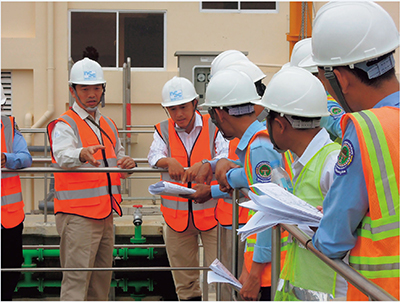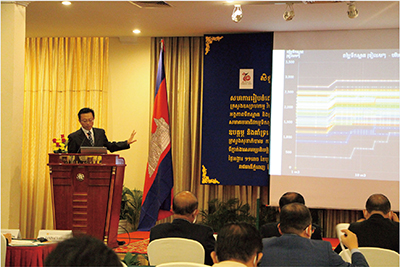Stories from the Field 04Public nomination
Contributing to Safe Water Supply in Cambodia with Kitakyushu City’s Know-How on “Water Distribution Block Technology”

Kitakyushu City officials providing guidance to Cambodian waterworks officials on the operation and maintenance of a water treatment plant in Kampot Province built with the cooperation of Japan (Photo: Kitakyushu City Water and Sewer Bureau)

Mr. Sasada explaining the situation of water administration in Cambodia to water administration officials at a local seminar (Photo: Kitakyushu City Water and Sewer Bureau)
The civil war of Cambodia, which continued until the signing of the Peace Agreements in 1991, left its water supply facilities in ruins. In addition to water leakage due to deterioration, illegal connections of water pipes were also frequent, pushing the non-revenue water (NRW) rate, which indicates the percentage of unbilled fees due to water leakage and water theft, up to 70% in 1993. In response to a request from the Government of Cambodia, Japan began rebuilding water infrastructure in 1993 in collaboration with the World Bank, the Asian Development Bank (ADB), and other partners. In 1999, a Kitakyushu City official was dispatched as an individual expert, which led to the launch of a JICA technical cooperation project. Kitakyushu City personnel were dispatched to provide technical guidance on water leakage prevention, passing on the knowledge they had cultivated in water administration. Through this cooperation, Phnom Penh’s NRW rate improved to 8%, on par with developed countries. As of 2006, on completion of the “Project on Capacity Building for Urban Water Supply System in Cambodia (Phase 1)”, water services had dramatically improved and tap water had reached a potable level. This success became hailed as the “Miracle of Phnom Penh.”
Mr. SASADA Kazuhiro, Deputy Director of the International Project Division of the Water and Sewer Bureau, Kitakyushu City, describes the effort at the time: “The know-how of ‘water distribution block technology,’ implemented in the water supply service in Kitakyushu City, brought great results in reducing the NRW rate in Cambodia. This method consists of dividing a water distribution area into several blocks and then investigating the water leakage rate in each block to identify the cause, thereby reducing water leakage and water theft. This led to improving the revenue of the water supply business of the Phnom Penh Water Supply Authority, which enabled them to implement measures to improve water quality, leading to the ‘miracle.’”
Meanwhile, water services in regional cities other than Phnom Penh were inadequate, and there was an urgent need to improve facilities and management capacity. For this reason, Japan provided grant aid to help build local water treatment plants, and implemented technical cooperation projects in the second phase from 2007 and the third phase from 2012. Accordingly, to support the sustainable water supply business in local cities in Cambodia, Kitakyushu City continued to dispatch its personnel as cooperation experts and provide technical cooperation to enhance the operation and maintenance capacities of water supply facilities at eight provincial waterworks, including Siem Reap Province. Looking back on Kitakyushu City’s long-standing support, Mr. Sasada says, “At the beginning of the project, waterworks in seven of the eight cities were in a severe financial situation, with single fiscal years ending in deficit. By the end of the third phase in 2017, however, all eight cities had become able to end single fiscal years in surpluses. In other words, we were able to establish the foundation for a viable water supply business in a short period. Kitakyushu City also participated in the ‘Project for Strengthening Administrative Capacity of Urban Water Supply in Cambodia’ implemented by JICA from 2018 to March 2023. In this project, with the aim of strengthening the governance of water administration, we provided cooperation to the Ministry of Industry, Science, Technology & Innovation, which has jurisdiction over the water sector, in the strengthening of organizations, legal development, licensing services, management of water supply operators, and human resources development.”
In Cambodia, many private water supply operators operate mainly in densely populated areas where business is relatively easy to become viable. However, the country lacks in showing a clear view or policy to ensure that all citizens receive safe and affordable water services. In response to this, a three-year project was launched in May 2023 to help formulate a development plan for urban water supply for the water sector across Cambodia. “Local people told me that thanks to Kitakyushu City the water quality was improved. It makes me proud to be a member of the water administration,” says Mr. Sasada with a smile. Cooperation from Kitakyushu City in water supply services is expected to continue.
<< Previous Page Next Page >>
Main Text | Reference Statistics | Stories from the Field | Master Techniques from Japan to the World | ODA Topics
